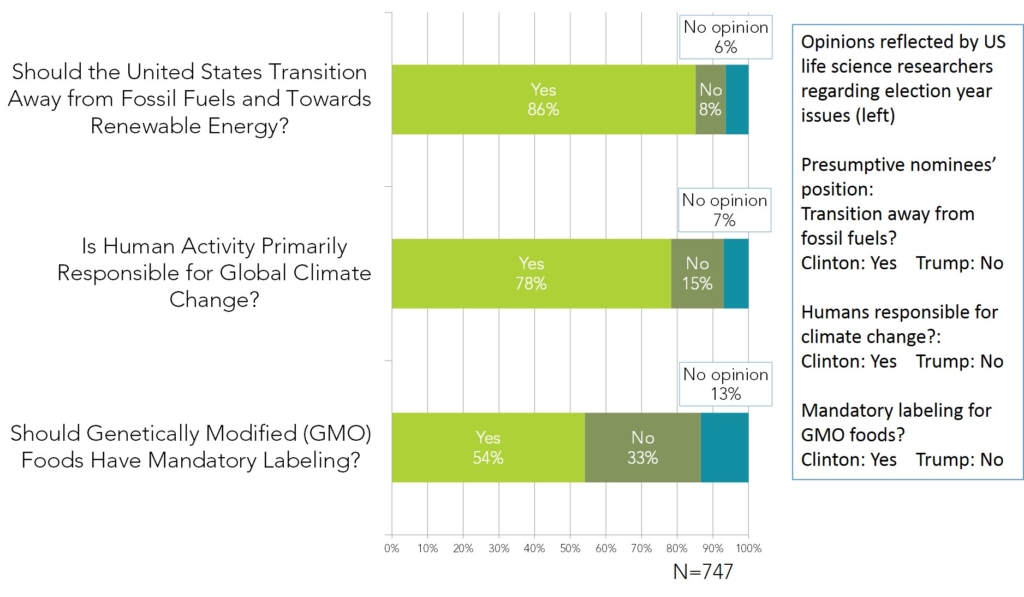In a recent summary of the presumptive presidential nominees’ positions on issues related to science and the environment including GMO labeling, global climate change and fossil fuels, there was a clear dichotomy. That is not likely to surprise many in an election year. However, we were interested in seeing what actual scientists thought of these “Science and Environment” political issues.
Percepta polled 747 active researchers in the United States asking three simple questions: 1) Should Genetically Modified (GMO) Foods Have Mandatory Labeling?, 2) Is Human Activity Primarily Responsible for Global Climate Change? and 3) Should the United States Transition Away from Fossil Fuels and Towards Renewable Energy?
The results are reflected in the figure below. The greatest consensus of scientist opinions was seen on the fossil fuels issue where 86% of participants indicated they believed the US should move away from fossil fuels. On a related issue, 78% of participating scientists believe that human activity is primarily responsible for global climate change. However, when it comes to opinions on the labeling of genetically modified (GMO) foods, a topic closer to many life scientist’s expertise, consensus largely evaporates. Only a slight majority (54%) of participating scientists believed that genetically modified foods should have mandatory labeling. In addition, 13% held no opinion on the topic, suggesting that it is not much of an issue in these participant’s minds.
The greatest consensus of scientist opinions was seen on the fossil fuels issue where 86% of participants indicated they believed the US should move away from fossil fuels. On a related issue, 78% of participating scientists believe that human activity is primarily responsible for global climate change. However, when it comes to opinions on the labeling of genetically modified (GMO) foods, a topic closer to many life scientist’s expertise, consensus largely evaporates. Only a slight majority (54%) of participating scientists believed that genetically modified foods should have mandatory labeling. In addition, 13% held no opinion on the topic, suggesting that it is not much of an issue in these participant’s minds.
Does this result reflect the opinion that labeling of GMO containing foods is generally believed to be of no importance by 46% of life scientists? It may not be that simple. A quick review of the many misconceptions regarding GMOs in a recent article in The New York Times reveals the complexity of this issue. Mandatory labeling would not, for instance, indicate if a farm animal such as a chicken meant for human consumption, is fed regularly with genetically modified grains such as corn and soy. Genetically modified organism (GMO) has a specific meaning and does not apply to all organism subject to recombination DNA technologies. Organisms that have had a gene deleted or moved, for example do not qualify. Only organisms modified with DNA from another species meet the GMO criteria. Labeling would reflect none of these points and thus may mislead consumers inadvertently.
Scientists, like policy makers, spend their careers dealing with complexity and are usually quick to recognize that there are no simple solutions. Like many political issues, pro or con positions taken by candidates on complex subjects such as GMO labeling, global climate change and fossil fuels are often not reflective of what is really going on but are more targeted at getting a vote. To take liberty with a famous reflection on the nature of reality go ahead and “Row, row, row your vote gently down a stream. Merrily, merrily, merrily, merrily. Life is but a dream”.
For more information regarding these data and other polls and reports available please contact Percepta.


Leave a Reply